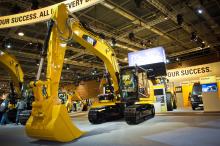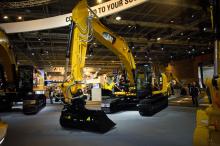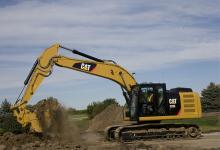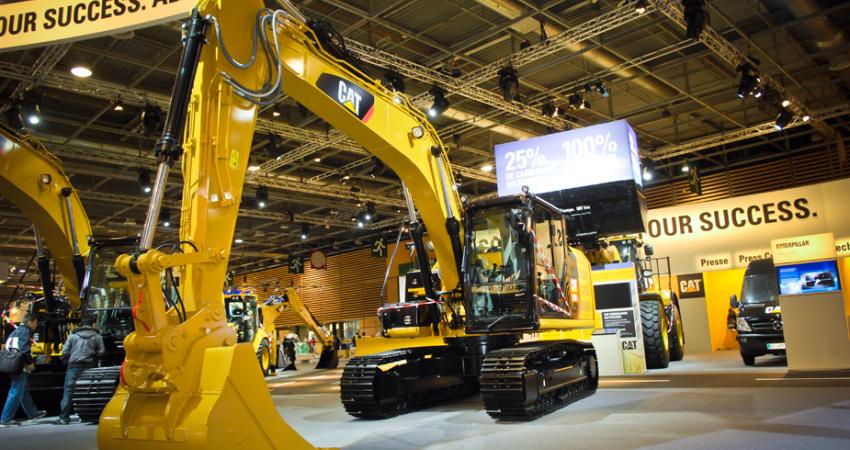The new 13.6tonne Caterpillar 312E small crawler excavator replaces the 312D, while the new 16.7tonne 316E takes over from the 315D. Both machines feature what are said to be highly efficient Cat engines to EU Stage IIIB emissions standard, while providing fuel savings of 8% and 9% respectively.
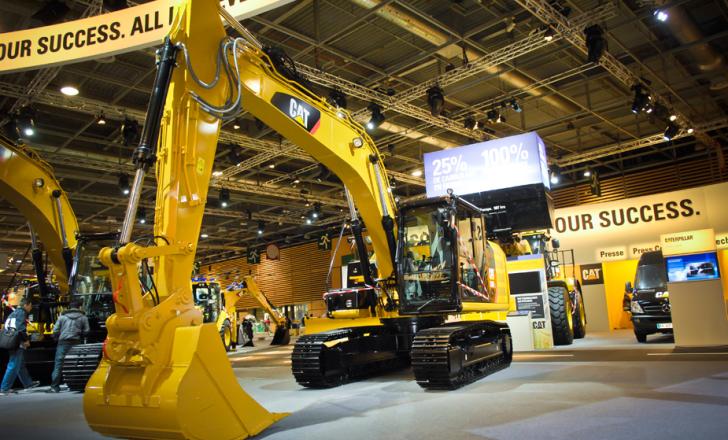
Caterpillars 316E excavator Live at INTERMAT
The new 13.6tonne 178 Caterpillar 312E small crawler excavator replaces the 312D, while the new 16.7tonne 316E takes over from the 315D. Both machines feature what are said to be highly efficient Cat engines to EU Stage IIIB emissions standard, while providing fuel savings of 8% and 9% respectively.
Caterpillar says operators will benefit from an improved cab environment from the two models, with a choice of seating including heating and cooling options. Time delay lighting, additional handrails and improved serviceability will, Cat hopes, make these compact machines popular with contractors and rental companies.
Cat Grade Control Depth and Slope technology is also available as an option for both small excavators, to increase productivity and performance in a range of digging and loading applications.
The 312E and 316E are powered by a Cat C4.4 ACERT electronically controlled diesel engine, replacing the previous C4.2. The C4.4 is said to use a suite of technologies, including the Cat Electronic Control Module (ECM) and the Cat Clean Emission Module (CEM) to meet the EU Stage IIIB emissions standards. The CEM incorporates a Diesel Oxidation Catalyst (DOC) and a Diesel Particulate Filter (DPF) which are said to perform throughout the working cycle of the machine, cutting costs for customers without causing disruption to operations. The Cat C4.4 ACERT allows the use of bio-diesel fuel up to B20 (bio-diesel 20% mixture meeting EN 14214 or ASTM 6751).
Equipped with common-rail fuel injection technology and an air-to-air after cooler, the C4.4 produces 95hp (70kW) in the 312E and 121hp (89kW) in the 316E, in line with the previous models. A power management system provides two power modes for the operator, a high power mode and an economy mode. High power sets the 316E engine speed at 1,950 rpm (1,800 rpm on the 312E), while economy uses just 1,800 rpm (1,700 rpm on 312E). A low idle speed of 1,150 rpm (1,100 rpm on 312E) further reduces fuel consumption.
The 312E and 316E cabin seats include a reclining back, upper and lower seat slide adjustments and height and tilt angle adjustment. Hydraulic joystick controls feature independent graduated height adjustment, allowing operators of all sizes to remain comfortable and productive throughout a working day.
E Series excavators have a clear LCD monitor that is said to be 40% larger than the D Series model. With a higher resolution this monitor, according to Cat, provides operators and technicians with vital operating and performance information.
Both the 312E and the 316E are available with a choice of main boom and dipper sticks, to suit a variety of applications. The two machines can be specified with hydraulic or electric tool control options and Caterpillar offers a wide range of work tools, along with general duty and severe duty buckets. A quick coupler is also available for either model.
2 Internal 2 4824 0 oLinkInternal <span class="oLinkInternal"><span class="oLinkInternal">View more videos</span></span> Video false /event-news/intermat-2012/video/ true false %>
Caterpillar says operators will benefit from an improved cab environment from the two models, with a choice of seating including heating and cooling options. Time delay lighting, additional handrails and improved serviceability will, Cat hopes, make these compact machines popular with contractors and rental companies.
Cat Grade Control Depth and Slope technology is also available as an option for both small excavators, to increase productivity and performance in a range of digging and loading applications.
The 312E and 316E are powered by a Cat C4.4 ACERT electronically controlled diesel engine, replacing the previous C4.2. The C4.4 is said to use a suite of technologies, including the Cat Electronic Control Module (ECM) and the Cat Clean Emission Module (CEM) to meet the EU Stage IIIB emissions standards. The CEM incorporates a Diesel Oxidation Catalyst (DOC) and a Diesel Particulate Filter (DPF) which are said to perform throughout the working cycle of the machine, cutting costs for customers without causing disruption to operations. The Cat C4.4 ACERT allows the use of bio-diesel fuel up to B20 (bio-diesel 20% mixture meeting EN 14214 or ASTM 6751).
Equipped with common-rail fuel injection technology and an air-to-air after cooler, the C4.4 produces 95hp (70kW) in the 312E and 121hp (89kW) in the 316E, in line with the previous models. A power management system provides two power modes for the operator, a high power mode and an economy mode. High power sets the 316E engine speed at 1,950 rpm (1,800 rpm on the 312E), while economy uses just 1,800 rpm (1,700 rpm on 312E). A low idle speed of 1,150 rpm (1,100 rpm on 312E) further reduces fuel consumption.
The 312E and 316E cabin seats include a reclining back, upper and lower seat slide adjustments and height and tilt angle adjustment. Hydraulic joystick controls feature independent graduated height adjustment, allowing operators of all sizes to remain comfortable and productive throughout a working day.
E Series excavators have a clear LCD monitor that is said to be 40% larger than the D Series model. With a higher resolution this monitor, according to Cat, provides operators and technicians with vital operating and performance information.
Both the 312E and the 316E are available with a choice of main boom and dipper sticks, to suit a variety of applications. The two machines can be specified with hydraulic or electric tool control options and Caterpillar offers a wide range of work tools, along with general duty and severe duty buckets. A quick coupler is also available for either model.
%$Linker:

